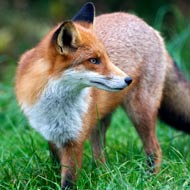Fox hunting opposition at all-time high

The Hunting Act 2004 has helped more than 100,000 animals including foxes, hares and deer.
Opposition to fox hunting is at an all-time high, according to figures published by the League Against Cruel Sports.
Figures show that 85 per cent of the public support keeping the ban on fox hunting. The figures come after a turbulent year for hunting, where the government’s announcement to offer a free vote on repealing the Hunting Act triggered a public outcry.
Director of campaigns for the League Against Cruel Sports, Chris Luffingham, said: “With 85 per cent of the public saying they do not want fox hunting made legal again, there has never been a better time to strengthen the Hunting Act and bring an end to the illegal persecution of wildlife still going on under the guise of ‘trail’ hunting.
“The realities of ‘trail’ hunting have been well and truly exposed this year and the extent to which foxes, hares and deer are still being chased and killed has really shocked people. Time and time again hunts are getting away with circumventing the law and that needs to stop.”
According to a study carried out by the League Against Cruel Sports, the Hunting Act 2004 has helped more than 100,000 animals including foxes, hares and deer. However, evidence suggests that since hunting with dogs was outlawed, most have been hunting illegally and using ‘trail’ hunting as a cover.
Mr Luffingham added: “A mockery is being made of the very legislation put in place to try and protect wildlife. Hunts claim to be ‘trail’ hunting and when animals end up being chased and killed, they simply shrug the incidents off as ‘accidental’. All the while the bloodsport lobby do nothing to hide the fact that they’re waiting for the hunting ban to be repealed; that makes these ‘accidents’ look pretty suspicious.
“During 2017, we’ve seen the Government make some great steps in terms of its commitment to animal welfare, and as we move into 2018, we’d like to see a strengthening of the Hunting Act as part of this commitment. There is overwhelming support for the ban on hunting; now it’s time for improved legislation to put an end to wildlife suffering in the name of ‘sport’ once and for all.”



 The Veterinary Medicines Directorate (VMD) is inviting applications from veterinary students to attend a one-week extramural studies (EMS) placement in July 2026.
The Veterinary Medicines Directorate (VMD) is inviting applications from veterinary students to attend a one-week extramural studies (EMS) placement in July 2026.